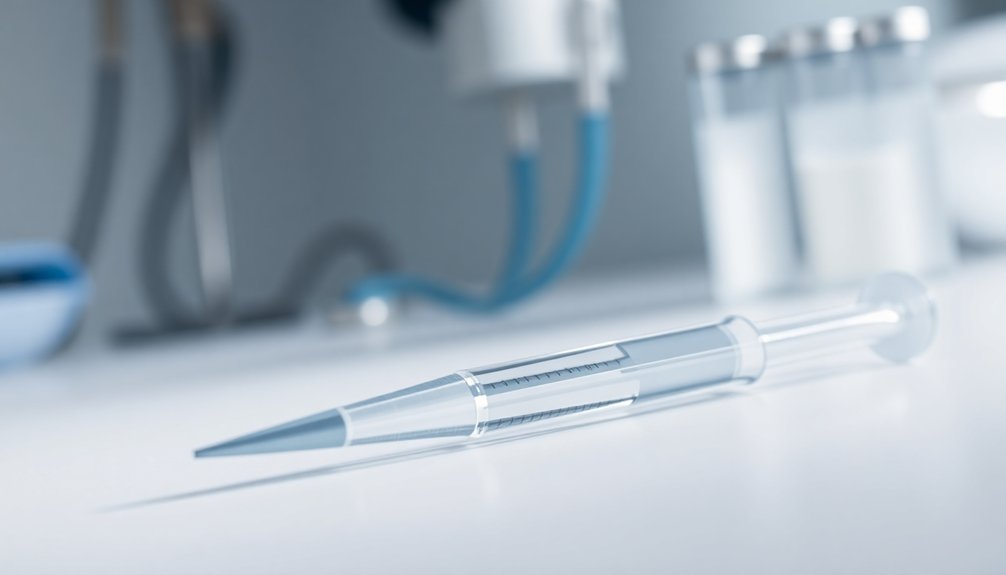Polypropylene hub needles play a crucial role in healthcare, primarily for tasks like vaccinations, blood draws, and medication administration. They're single-use, which enhances safety and minimizes the risk of cross-contamination. With color-coded hubs, you can quickly identify the appropriate needle gauge in urgent situations. Their lubricated stainless steel design ensures comfort during procedures. Plus, they're individually packaged for sterility, reducing the chance of infections. Whether you're a healthcare professional or a patient, understanding their use can make a significant difference. If you're curious about their other benefits and features, there's plenty more to discover.
Key Takeaways
- Polypropylene hub needles are essential for administering vaccinations, ensuring safe and effective immunization.
- They are widely used for blood draws, facilitating accurate and efficient sample collection.
- These needles are employed for medication administration, allowing precise delivery of treatments.
- Their design promotes safety through single-use applications, minimizing the risk of cross-contamination.
- Compatible with various syringes, they enhance versatility across different medical procedures and settings.
Overview of Polypropylene Hub Needles
In the realm of medical applications, polypropylene hub needles shine as essential tools designed for single-use. These sterile needles are crafted to ensure safety and minimize the risk of cross-contamination in clinical environments. A key feature is their color-coded polypropylene hubs, which make gauge identification quick and easy, enhancing your efficiency during procedures.
Made with a lubricated stainless steel cannula, these needles improve both performance and comfort during injections. You'll find that polypropylene hub needles are compatible with various syringes, which adds to their versatility. Whether you're administering vaccinations or conducting blood draws, these needles are up to the task.
Each needle is packaged individually in tamper-evident seals, ensuring they remain sterile and safe until you're ready to use them. This level of attention to detail helps maintain hygiene standards in medical settings, making these needles a reliable choice for healthcare professionals.
When you choose polypropylene hub needles, you're investing in quality tools that prioritize patient safety and comfort, making them indispensable in your medical practice.
Key Features and Benefits
Designed with both the practitioner and patient in mind, polypropylene hub needles boast several key features that enhance their effectiveness in medical applications. These needles are engineered for optimal performance and safety, ensuring a smooth experience during procedures.
- Enhanced Durability: Lightweight yet strong, these needles withstand the rigors of medical use without compromising quality.
- Quick Gauge Identification: The color-coded polypropylene hubs allow you to swiftly select the right gauge, saving valuable time during critical moments.
- Non-DEHP and Latex-Free: These features significantly reduce the risk of allergic reactions, making them suitable for sensitive patients and ensuring peace of mind.
- Sterile Packaging: Each needle is individually packaged and sterile, minimizing contamination risk and promoting hygiene in clinical environments.
Additionally, the translucent hub provides visibility of flashback, allowing you to confirm successful venous access during intravenous procedures.
Medical Applications and Uses

Polypropylene hub needles are essential tools in various medical applications, including vaccinations, blood draws, and medication administration. Their lightweight and durable construction makes them ideal for these tasks.
Because they're designed for single-use, you can promote safety and minimize the risk of cross-contamination in clinical settings.
You'll appreciate the color-coded polypropylene hubs, which facilitate easy gauge identification. This allows you to quickly select the appropriate needle size for specific procedures.
Plus, polypropylene hub needles are compatible with a range of syringes and needles, enhancing their versatility for different medical and laboratory applications.
Their anti-coring, tri-beveled design ensures consistent sharpness and comfort during injections, making them suitable not only for human patients but also for veterinary use.
Whether you're performing routine vaccinations or more specialized procedures, you can rely on these needles to deliver precision and efficiency.
Safety and Compliance Standards
Safety and compliance standards play a vital role in the effectiveness of polypropylene hub needles in medical settings. These standards ensure that the needles used in clinical environments are safe and reliable for both patients and healthcare providers.
Here are some key aspects that highlight their importance:
- Regulatory Compliance: Polypropylene hub needles meet stringent regulatory standards for medical devices.
- Reduced Allergic Reactions: Being non-DEHP and latex-free, they minimize the risk of allergic reactions, promoting a safer experience for everyone involved.
- Sterility Assurance: Each needle is individually packaged to maintain sterility, preventing contamination and ensuring compliance with health safety protocols.
- ISO Standards Adherence: Their manufacturing follows ISO standards for color coding and identification, allowing for safe and efficient use.
Regular quality assurance testing during production further guarantees that these needles meet high safety and performance criteria.
Market Trends and Insights

The rising popularity of polypropylene hub needles in medical settings reflects a significant shift in healthcare practices. You'll notice that the demand for these lightweight and durable sterile needles is increasing, primarily because they enhance user comfort and lower the risk of breakage during procedures.
This trend towards single-use needles is critical as healthcare providers aim to minimize infection risks, further driving market growth.
In 2022, the global market for medical needles, including polypropylene hub variants, exceeded $7 billion, and projections indicate steady growth due to rising healthcare spending and procedural demands.
As you assess needle options, keep in mind that regulatory compliance and safety standards, like ISO certifications, play a crucial role in purchasing decisions. Healthcare providers are prioritizing quality assurance, ensuring they select the best products for their needs.
Additionally, innovations in needle technology, such as anti-coring and anti-friction coatings, are being adopted to enhance both performance and patient comfort.
This focus on advanced features is contributing to the expansion of polypropylene hub needle sales, indicating a positive outlook for the market in the coming years.
Frequently Asked Questions
What Is the Ideal Polypropylene Hub Used For?
You'll find that the ideal polypropylene hub is designed for precise and comfortable injections, offering a lightweight, durable structure. Its color-coded features help you quickly identify the right gauge for your specific needs.
Which Is Better Aluminum or Poly Hub Needles?
When choosing between aluminum and polypropylene hub needles, consider your specific needs. Polypropylene's lightweight and visibility advantages may suit some situations, while aluminum offers stability. Ultimately, your preference and procedural requirements should guide your decision.
What Is a Poly Hub Needle?
A poly hub needle's a hypodermic needle featuring a durable polypropylene hub. It's lightweight, latex-free, and comes in various gauges, ensuring you have the right tool for safe and effective injections in medical settings.
What Kind of Needles Do Hospitals Use?
Hospitals typically use lightweight, durable needles made from materials like polypropylene. These needles come in various gauge sizes, are color-coded for easy identification, and are designed for single-use to ensure safety and prevent contamination.

